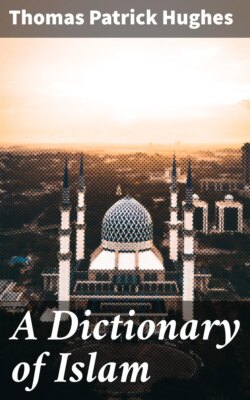Читать книгу A Dictionary of Islam - Thomas Patrick Hughes - Страница 19
На сайте Литреса книга снята с продажи.
ОглавлениеCROCODILE. Arabic Timsāḥ. The flesh of a crocodile is unlawful for food to a Muḥammadan. (Hamilton’s Hidāyah, iv. 74.)
CROSS, The. Arabic Aṣ-Ṣalīb. The Qurʾān denies the crucifixion of our blessed Lord [CRUCIFIXION], and it is related by al-Wāqidī that Muḥammad had such a repugnance to the form of the cross that he broke everything brought into his house with that figure upon it. (Muir, iii. 61.) According to Abū Hurairah, the Prophet said, “I swear by heaven, it is near, when Jesus the Son of Mary will descend from heaven upon your people, a just king, and He will break the cross, and kill the swine.” (Mishkāt, xxiii. c. vi.) The Imām Abū Yūsuf says that if a cross or a crucifix is stolen from a church, amputation (the punishment for theft) is not incurred; but if it is stolen from a private dwelling it is theft. (Hamilton’s Hidāyah, vol. ii. p. 90.)
CRUCIFIXION. The Crucifixion of the Lord Jesus Christ is denied by the teaching of the Qurʾān. [JESUS CHRIST.] It is a punishment sanctioned by the Muḥammadan religion for highway robbers. (Hamilton’s Hidāyah, vol. ii. 131.)
CRUELTY. A striking instance of the cruelty of Muḥammad’s character occurs in a tradition given in the Ṣaḥīḥu ʾl-Buk͟hārī (p. 1019). Anas relates, “Some of the people of the tribe of ʿUkl came to the Prophet and embraced Islām; but the air of al-Madīnah did not agree with them, and they wanted to leave the place. And the Prophet ordered them to go where the camels given in alms were assembled, and to drink their milk, which they did, and recovered from their sickness. But after this they became apostates, and renounced Islām, and stole the camels. Then the Prophet sent some people after them, and they were seized and brought back to al-Madīnah. Then the Prophet ordered their hands and their feet to be cut off as a punishment for theft, and their eyes to be pulled out. But the Prophet did not stop the bleeding, and they died.” And in another it reads, “The Prophet ordered hot irons to be drawn across their eyes, and then to be cast on the plain of al-Madīnah; and when they asked for water it was not given them, and they died.”
Sir William Muir (vol. iv. p. 307) says: “Magnanimity or moderation are nowhere discernible as features in the conduct of Muḥammad towards such of his enemies as failed to tender a timely allegiance. Over the bodies of the Quraish who fell at Badr he exulted with savage satisfaction; and several prisoners, accused of no crime but of scepticism and political opposition, were deliberately executed at his command. The Prince of K͟haibar, after being subjected to inhuman torture for the purpose of discovering the treasures of his tribe, was, with his cousin, put to death on the pretext of having treacherously concealed them, and his wife was led away captive to the tent of the conqueror. Sentence of exile was enforced by Muḥammad with rigorous severity on two whole Jewish tribes at al-Madīnah; and of a third, likewise his neighbours, the women and children were sold into distant captivity, while the men, amounting to several hundreds, were butchered in cold blood before his eyes.”
